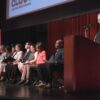March 7, 2016. The Herald Tribune.
SARASOTA — Hundreds of residents will urge Gov. Rick Scott to approve a legislative funding request for a new mental health diversion court in Sarasota County by inundating his office with individually signed cards.
Distributed by an interfaith organization called Sarasota United For Responsibility and Equity, or SURE, the cards ask Scott not to veto the allocation initially requested by state Rep. Greg Steube, R-Sarasota.
<!–more>
Residents will be asked to sign the cards Monday evening at SURE’s annual meeting in Sarasota. They will either be hand delivered or mailed to Scott’s office this week, said SURE Co-Chairman the Rev. Wes Bixby.
“We hope for turnout of over 1,000 folks from our 16 congregations,” Bixby said. “Even if 700 people sign it, that’s a big packet arriving on Gov. Scott’s desk letting him know constituents in Sarasota County are watching.”
Steube originally had asked for nearly $1 million, which would have financed the court’s first full year of operation, but lawmakers cut that amount to $250,000 during budget negotiations. He currently is seeking to restore the request to its original amount before the budget conference ends, said his spokeswoman, Annalee Morris.
“It’s one of Rep. Steube’s top priority issues,” Morris said.
The court is the brainchild of Sarasota County Court Judge Erika Quartermaine, who aims to slow the revolving door of a criminal justice system that repeatedly releases and rearrests those found incompetent to stand trial.
Many, but not all, of these individuals are homeless.
Called Comprehensive Treatment Court, or CTC, the program in its first year would accept around 80 to 160 nonviolent, low-level offenders suffering from mental illness and divert them from Sarasota County jail to an appropriate mental health organization, where they would receive help and the chance to avoid criminal charges.
The program has support from several key stakeholders, including Sarasota County Sheriff Tom Knight and 12th Circuit Chief Judge Charles Williams, but it needs $940,000 to get off the ground.
Expenses include salaries for crisis-intervention team members, housing for program participants, and funding for the array of incidentals – medication, clothing, even emergency dental work – that participants might need during the course of their care, said Mary Ruiz, CEO of Centerstone of Florida, which was tapped to oversee treatment.
Lawmakers must approve a final budget by Friday when the legislative session ends. It then goes to Scott, who can veto line items he doesn’t want to fund. Last year, for example, Scott rejected $461 million worth of projects and proposals.
If CTC gets the ax during this year’s gubernatorial budget review, SURE has another strategy: It will seek funding from local governments, including Sarasota County and the city of Sarasota.
The group already secured a commitment of support from Sarasota County Commissioner Paul Caragiulo, who confirmed he will ask his board to help finance the fledgling court if state funds fall through.
“I’m happy to advocate for some funding,” Caragiulo said. “I don’t think the county should fund the whole $1 million, but I think it would be appropriate for us to contribute something.”
Caragiulo is expected to speak at Monday’s SURE meeting, along with Judge Quartermaine.
“We feel like this is a good idea, and it needs to be funded,” Bixby said. “We’re not going to give up.”





